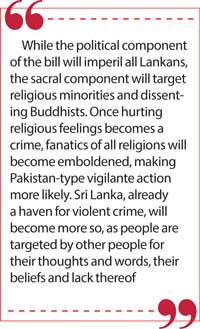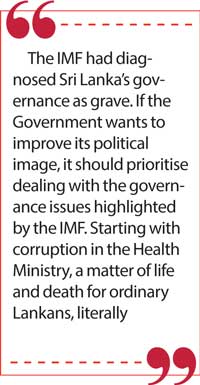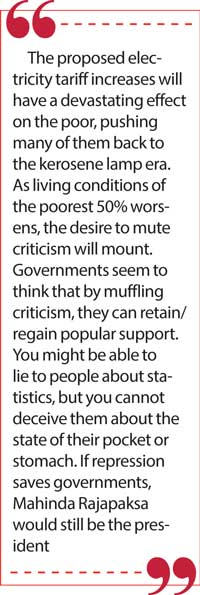Saturday Feb 14, 2026
Saturday Feb 14, 2026
Wednesday, 4 October 2023 00:25 - - {{hitsCtrl.values.hits}}
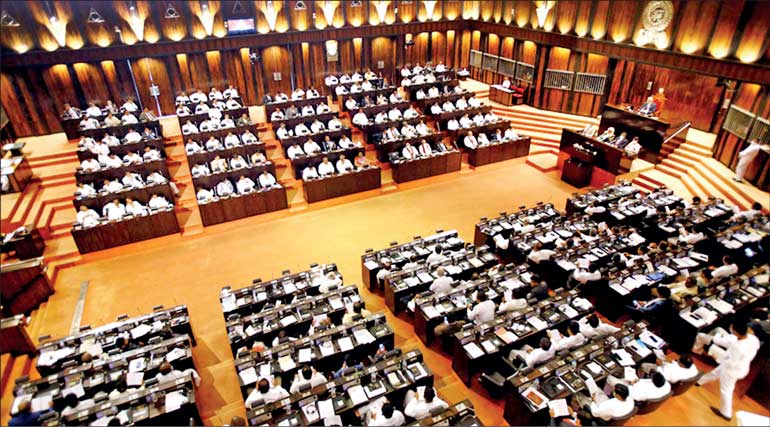
Every single Government parliamentarian who raises his or her hand to back this bill should bear in mind that one year on, their opponents are likely to occupy the judgement seat and they will be on the dock
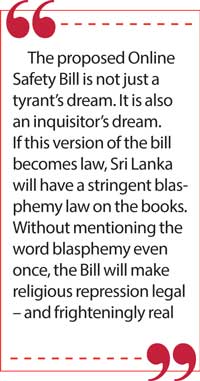 By Tisaranee Gunasekara
By Tisaranee Gunasekara
Ramzi Razeek was arrested in the early days of the pandemic when knowledge of the virus was sketchy and myths filled the gaps. The Rajapaksa regime had militarised a health crisis. The army commander was running the show. Patients were treated like enemy aliens, entire communities forced into poorly-prepared quarantine centres literally at gunpoint by soldiers often without even facemasks.
As the ‘enemy-invasion’ narrative of the pandemic solidified, so did the nature of the enemy; Muslims, naturally. Online commentators started accusing Muslims of birthing the virus and calling Muslim patients ‘suicide bombers.’ Razeek, a retired Government official and social media commentator, criticised this hatemongering on social media, advocating an ideological jihad (struggle) for justice and democracy. The struggle should be waged with pen and keyboard, he wrote, and on behalf of all Lankan citizens.
Sri Lanka was still living in the long aftermath of the Easter Sunday massacre. The word Jihad was a red rag. Within hours, Razeek began receiving online-threats. He complained to the police. Then the CID arrived, not to investigate the threats, but to arrest him for violating ICCPR and Cyber Crimes acts. Two of the officers assaulted him, he would subsequently claim. He was produced before a magistrate and remanded. Taking into consideration his health condition, the magistrate ordered the police to take him to prison hospital or general hospital. The police took 25 days to obey that order. In the interim, Razeek was held in Negombo’s Pallansena Prison with no medicine or medical attention.
During the first wave of the pandemic, if anyone violated the ICCPR, it was the likes of General Shavendra Silva and Minister Mahindananda Aluthgamage – by inciting Muslim-phobia. The General led the way, telling Derana, “Yesterday, a patient was discovered from Akurana... Then we discovered another person from Puttlam... He is a Muslim. In both places they are Muslims.” The Minister followed, opining at a talk-show, again on Derana, “Today, 20 patients were identified. Of these, 19 were of Muslim faith. 19!” In April 2020, if anyone violated the Cyber Crimes Act, it was those who threatened Razeek online. Yet all of them remained as free as uncaged birds while Razeek spent 161 days behind bars. Arrested on 9 April 2020, he was finally bailed out on 17 September.
Last month, the court released him from all charges at the request of the AG’s Department. As in the case of writer Shakthika Sathkumara, the authorities had failed to find even a shred of evidence against him.
Another chapter in life thus ended, Razeek wrote on his social media. But for the country, a chapter of even greater persecution might be beginning.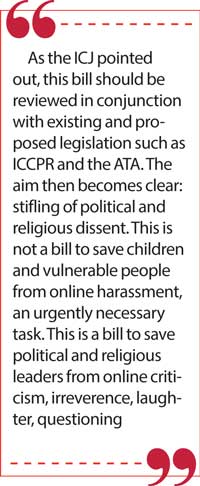
Had the proposed Online Safety Bill been in the books in April 2020, Razeek could have been charged on multiple counts – provocation of riots, perhaps, offending and outraging religious feelings certainly. If a comedian can be arrested for making a joke under the ICCPR, what wouldn’t our authorities do with a law as interpretatively wide open as the Steppe and as nebulous as mist?
Blasphemy, now?
The proposed Online Safety Bill is not just a tyrant’s dream. It is also an inquisitor’s dream. If this version of the bill becomes law, Sri Lanka will have a stringent blasphemy law on the books. Without mentioning the word blasphemy even once, the Bill will make religious repression legal – and frighteningly real.
Some of the offenses under the Bill are clearly religious in nature: disturbing a religious assembly through false statements, communication of false statements with the intention of offending religious sentiments, and communication of false statements with the intention of outraging religious feelings. A false statement is defined as a statement that is known or believed by its maker to be incorrect or untrue. A five-member commission is charged with looking into the hearts and minds of alleged offenders to decide whether they erred knowingly or not. Would the Commission be using polygraphs or mindreading? This could have been comic had the implications not been so deadly.
The Commission tasked with separating true from false will be appointed by the president. Since presidents in this country are leaders of political parties, their appointees too would be political ones, men and women who are willing to obey the appointing authority (that was why Mahinda Rajapaksa, via the 18th Amendment, made himself the sole appointing authority of the independent commissions introduced by the 17th Amendment). What if, for example, this bill had been the law under President Gotabaya? His five-member commission would have included a general, a monk, a friendly media-boss, a GMOA doctor, and a Viyath Maga member. Imagine how they would have determined true from false!
As the ICJ pointed out, this bill should be reviewed in conjunction with existing and proposed legislation such as ICCPR and the ATA. The aim then becomes clear: stifling of political and religious dissent. This is not a bill to save children and vulnerable people from online harassment, an urgently necessary task. This is a bill to save political and religious leaders from online criticism, irreverence, laughter, questioning...
Starting with writer Shakthika Sathkumara, the ICCPR has been misused as an anti-blasphemy law to persecute minorities and those Buddhists who fail to mind their religious Ps and Qs. While the ICCPR can be wielded to keep an offender behind bars for months, winning or even sustaining a case on that basis would be nearly impossible. The Online Safety Bill will fill that gap. So, arrest someone under the Online Safety Bill and the ICCPR; the latter would enable a long stint in remand while the former could enable an eventual conviction – meaning a three to five year prison sentence and/or a fine. This component of the bill is obviously a gift to political monks, an attempt to appease them by giving them a blasphemy law by another name, and thus the impunity they so ardently desire.
attempt to appease them by giving them a blasphemy law by another name, and thus the impunity they so ardently desire.
The Online Safety Bill has an equally disgraceful precedent – the Press Council Bill of 1973. Section 15 of that bill criminalised the publication of ‘profane matter’ defined as ‘any matter which is intended to insult any religion or the founder of any religion, any deity or saint venerated by the followers of any religion.’
“A prince need not worry unduly about conspiracies when people are well disposed towards him. But if they are his enemies and hate him, he must fear everything and everybody.” That was Machiavelli in The Prince. When governments sense their unpopularity, they tend to use repressive legislation as dams to prevent further leakage of public support. In 1973, the Press Council Bill was brought by a government that was becoming uncertain of winning the next election. In 2023, the Online Safety Bill is being brought by a government that is likely to lose any future election, if opinion polls are correct.
The Press Council Bill – and numerous other repressive laws and actions – didn’t save the United Front government from utter defeat in 1977. Soon, the Press Council Bill was being used to silence those who parented it, the SLFP, the LSSP, and the CP. While in opposition, the UNP clamoured against the Press Council Bill and promised to scrap it. Once in office, that promise was forgotten; instead the Bill was used to muffle the Opposition.
The fate of the Online Safety Bill will be no different. Every single Government parliamentarian who raises his or her hand to back this bill should bear in mind that one year on, their opponents are likely to occupy the judgement seat and they will be on the dock. Those who bring the bill today will be its victims tomorrow. To paraphrase John Donne, Ask not for whom this bell tolls, for it tolls for us all.
B.A. Siriwardane, the legendary editor of the Communist Party paper Aththa, was an outspoken critic of the Press Council Bill. His editorial of 31 October 1972 was ostensibly on the disappearance of the headgear on god Ganesh’s statue in the Kataragama devale. He called gods Ganesh and Katharagama, ‘elephant-head’ and ‘six-face’ (ali oluwa and saya muhuna) and offered sibling rivalry as explanation for the headgear’s disappearance. He wanted to make these comments before the Press Council Bill is passed, he wrote, for such irreverent words would be criminalised by the bill. He concluded with the warning that if politicians in power do not help the suffering people, their power will be taken away.
Those were more tolerant times. No monk, kapuwa or devotee descended on Aththa office demanding the editor’s head for poking fun at their gods. Now is something else. If the Bill is passed, and whenever a case of religious offense is heard, fanatics might descend on the courthouse to pressurise the judge to give the ‘right’ ruling. Why shouldn’t they, since they seemed to have driven one magistrate out of his job and out of the country already?
Magisterial wrongs
The Mullativu magistrate, T. Saravanaraja, resigned from his judicial posts alleging threats to his life and pressure from State authorities over his Kurundi rulings. He has since left the country. An investigation is pending.
Hopefully, the investigators will peruse the Hansard to see how parliamentarian Sarath Weerasekara witch-hunted the magistrate. Hiding behind his parliamentary privileges, the retired admiral attacked the magistrate twice. “We cannot be at all satisfied about the orders and decisions of the magistrate in charge of that area...” he said on the first occasion. “A few days ago, this Tamil magistrate came to Kurundi viharaya on an observational tour. I was also there... We must remind this magistrate that this is a Buddhist country... Not just separatist Tamil politicians but also magistrates with such attitudes are responsible for creating conflict between races and religions.”
Saying, “We must remind this magistrate that this is a Buddhist country,” to a Tamil man – if that is not a threat, what is it?
What was more concerning than retired admiral Weerasekara’s violent verbiage was the silence of Sinhala polity and society. When Sarath Weerasekara attacked a judicial official in the most uncouth terms, not a single parliamentarian objected. There was no condemnation afterwards, either by the Government or the Opposition. Even the usually vocal civil society was mostly silent on this issue. The same deafening silence reverberates about Saravanaraja’s resignation. Parliamentarian Mano Ganesan was correct when he wrote, “Episode declares
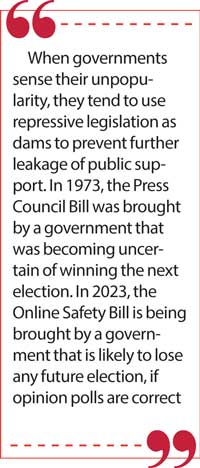
Lanka as a failed state. It’s the fall of the last bastion... But mainstream Sinhala politicos and civil society failed to respond firmly protecting the concept of rule of law.”
Against this political context, the Online Safety Bill, especially its sacral component, assumes an even deadlier nature. While the political component of the bill will imperil all Lankans, the sacral component will target religious minorities and dissenting Buddhists. Once hurting religious feelings becomes a crime, fanatics of all religions will become emboldened, making Pakistan-type vigilante action more likely. Sri Lanka, already a haven for violent crime, will become more so, as people are targeted by other people for their thoughts and words, their beliefs and lack thereof.
When General Shavendra Silva and Minister Mahindananda Aluthgamage made their hatemongering comments on Muslims, hardly anyone protested, not even the SJB and JVP representatives who were on the same talk-show. The two honourable exceptions were Mangala Samaraweera and Karu Jayasuriya. The SJB and the JVP were silent but the UNP was courageous enough to issue a statement of condemnation. Now the same UNP is one of the parties backing a draft legislation that is not just repressive politically but is also an attempt bring in a sweeping blasphemy law through the backdoor.
It is now a mostly forgotten fact that it was PM Rajiv Gandhi who opened the doors of Babri Masjid literally, thereby opening the political doors to floodwaters of Hindu extremism. Perhaps the UNP should recall what that did to the Congress Party.
The IMF had diagnosed Sri Lanka’s governance as grave. If the Government wants to improve its political image, it should prioritise dealing with the governance issues highlighted by the IMF. Starting with corruption in the Health Ministry, a matter of life and death for ordinary Lankans, literally.
The proposed electricity tariff increases will have a devastating effect on the poor, pushing many of them back to the kerosene lamp era. As living conditions of the poorest 50% worsens, the desire to mute criticism will mount. Governments seem to think that by muffling criticism, they can retain/regain popular support. You might be able to lie to people about statistics, but you cannot deceive them about the state of their pocket or stomach. If repression saves governments, Mahinda Rajapaksa would still be the president.
